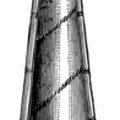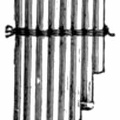The engraving represents a kind of trumpet made of wood, and nearly seven feet in length, which Gumilla found among the Indians in the vicinity of the Orinoco. It somewhat resembles the juruparis, a mysterious instrument of the Indians on the Rio Haupés, a tributary of the Rio Negro, south America.
The juruparis is regarded as an object of great veneration. Women are never permitted to see it. So stringent is this law that any woman obtaining a sight of it is put to death—usually by poison. No youths are allowed to see it until they have been subjected to a series of initiatory fastings and scourgings.
The juruparis is usually kept hidden in the bed of some stream, deep in the forest; and no one dares to drink out of that sanctified stream, or to bathe in its water. At feasts the juruparis is brought out during the night, and is blown outside the houses of entertainment. The inner portion of the instrument consists of a tube made of slips of the Paxiaba palm (Triartea exorrhiza). When the Indians are about to use the instrument they nearly close the upper end of the tube with clay, and also tie above the oblong square hole (shown in the engraving) a portion of the leaf of the Uaruma, one of the arrow-root family.
Round the tube are wrapped long strips of the tough bark of the Jébaru (Parivoa grandiflora). This covering descends in folds below the tube. The length of the instrument is from four to five feet. The illustration, which exhibits the juruparis with its cover and without it, has been taken from a specimen in the museum at Kew gardens. The mysteries connected with this trumpet are evidently founded 69on an old tradition from prehistoric Indian ancestors. Jurupari means “demon”; and with several Indian tribes on the Amazon customs and ceremonies still prevail in honour of Jurupari.
- Author
- Musical Instruments
Written by Carl Engel
Published in 1875
Available from gutenberg.org - Posted on
- Sunday 26 July 2020
- Dimensions
- 750*312
- Albums
- Visits
- 4973
- Downloads
- 66
 Download Photo
Download Photo





